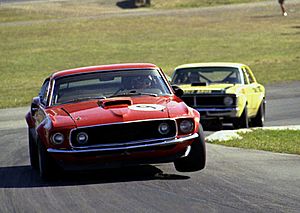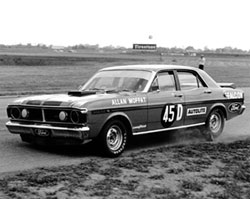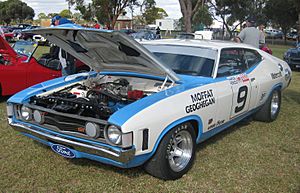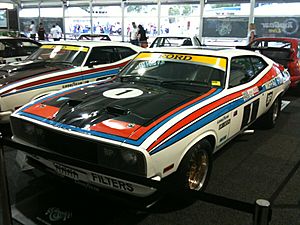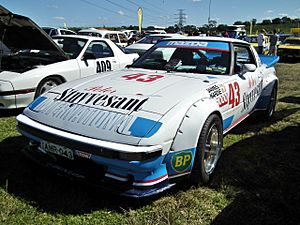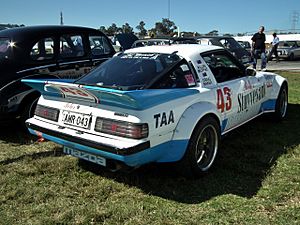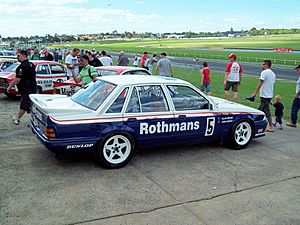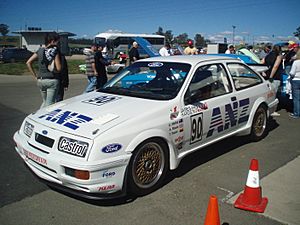Allan Moffat facts for kids
Quick facts for kids Allan Moffat,OBE |
|
|---|---|
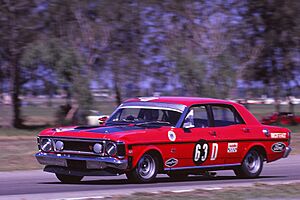
Moffat racing in the 1970 Rothmans 250 Production Classic
|
|
| Born | 10 November 1939 Saskatoon, Saskatchewan, Canada |
| Died | 22 November 2025 (aged 86) Melbourne, Victoria, Australia |
| Retired | 1989 |
| Related to | James Moffat (son) |
| Australian Touring Car Championship | |
| Years active | 1965–89 |
| Teams | Allan Moffat Racing |
| Starts | 100 |
| Wins | 32 |
| Best finish | 1st in 1973, 1976, 1977 & 1983 Australian Touring Car Championship |
| Previous series | |
| 1976 1980 1986 1986 1987 |
Australian Sports Sedan Ch. Australian Sports Car Champ. Australian Endurance Champ. FIA Touring Car Champ. World Touring Car Champ. |
| Championship titles | |
| 1973 1976 1976 1977 1980 1982 1983 1984 |
Australian Touring Car Champ. Australian Sports Sedan Ch. Australian Touring Car Champ. Australian Touring Car Champ. Australian Sports Car Champ. Australian Endurance Champ. Australian Touring Car Champ. Australian Endurance Champ. |
| Awards | |
| 1978 1999 2018 |
Order of the British Empire V8 Supercars Hall of Fame Sport Australia Hall of Fame |
Allan George Moffat (born November 10, 1939, and passed away on November 22, 2025) was a famous race car driver from Canada and Australia. He was known for his amazing skills on the track. Moffat won four championships in the Australian Touring Car Championship. He also achieved six wins in the Sandown 500 and four victories in the famous Bathurst 500/1000 races.
One of his big international wins was the 1975 12 Hours of Sebring race. Moffat was honored for his achievements. He was inducted into the V8 Supercars Hall of Fame in 1999. In 2018, he also joined the Sport Australia Hall of Fame.
Moffat had a long-standing friendly rivalry with fellow driver Peter Brock. They were the only drivers to win the Great Race at Bathurst in both its older 500-mile and newer 1000-kilometer formats. Later, they even became co-drivers!
Contents
Allan Moffat's Racing Journey
Allan Moffat was born in Saskatoon, Canada. When he was 17, his family moved to Melbourne, Australia. His father worked for Massey Ferguson and was transferred there. In the early 1960s, Moffat began his incredible motor racing career. He started racing in a Triumph TR3 car.
Early Years and the Mustang Era (1964-1971)
Moffat began his endurance racing in 1964. He and Jon Leighton drove a Ford Cortina Lotus. They finished fourth in the 1964 Sandown 6 Hour International race. This event was the start of what is now the Sandown 500.
In 1965, Moffat first competed in the Australian Touring Car Championship (ATCC). He drove a Lotus Cortina. After this, he spent time racing in the United States. He joined the new Trans-Am Series in 1966. He showed his talent by winning a race at Bryar Motorsports Park. He drove an Under 2L Lotus Cortina.
Moffat returned to Australia but also raced more in the US. He drove his Cortina and Ford Mustangs. He raced for Carroll Shelby in Trans-Am. He had Australian co-drivers like Horst Kwech and Harry Firth. Moffat even raced in the 24 Hours of Daytona and 12 Hours of Sebring. He also drove a Mercury Cougar for Bud Moore Engineering.
By 1969, Moffat lived full-time in Australia. He became a regular ATCC competitor. His bright red Coca-Cola-sponsored Ford Boss 302 Mustang was famous. This car was specially built for racing. With help from his team, he won 101 races between 1969 and 1972. This included the first win for a factory Boss Mustang. However, winning the ATCC in his Mustang was a dream that took longer. He finished 6th in 1970, 2nd in 1971, and 3rd in 1972.
Moffat and his Mustang were part of some unforgettable ATCC races. In 1971, he battled Bob Jane for the championship. Moffat started from pole position. He had to slow down due to a gearbox issue. Still, he fought back and finished very close behind Jane. In 1972, he had another thrilling race with Ian Geoghegan at Bathurst. Moffat's Mustang had great handling and brakes. During this race, Moffat faced a challenge when oil sprayed onto his car's windscreen. He had to drive carefully to see the track. He protested Geoghegan's car after the race, but it was dismissed.
The Mustang was not allowed in the Bathurst 500 race. This race was only for standard production cars before 1973. So, Moffat made his Bathurst debut in 1969. He drove a Ford works team Ford Falcon XW GTHO. He and Alan Hamilton finished fourth. Moffat was known for being gentle on his car's tires. This showed he could drive fast without wearing them out quickly.
The next two years were huge for Moffat. He became one of Australia's top drivers. The Falcon GTHO became almost unbeatable. In 1970, Ford Australia improved the Falcon XW GTHO Phase II. Moffat drove this car to victory in the 1970 and 1971 Bathurst races. He also won the 1970 Rothmans 250 Production Classic. In 1971, he made history. He was the first driver to lead the Bathurst 500 from start to finish. He drove the famous Ford Falcon GTHO Phase III.
The Supercar Scare and Rivalry (1972)
Moffat hoped for a third straight Bathurst win in 1972. Ford planned an even faster car, the 'Phase IV' Falcon GTHO. But news articles about '160mph Supercars' caused a stir. The government and media worried about such fast cars on public roads. So, Ford stopped making the Phase IV. This meant Moffat had to race an older car at Bathurst. His rival, Peter Brock, won that year. This race kicked off their famous rivalry!
Championship Wins and New Challenges (1973-1980)
In 1973, new rules changed racing in Australia. The ATCC and Bathurst races were now for Group C Touring Cars. These cars were slightly modified. Ford decided to stop supporting factory teams after 1973. This meant Moffat had to create his own team. Despite this, he won his first ATCC title in 1973. He also won the 1973 Hardie-Ferodo 1000 at Bathurst with Ian Geoghegan. They were the first winners when the race changed from 500 miles to 1000 km.
One night, Moffat's Falcon was stolen before a race. Another driver, Murray Carter, kindly loaned him his car. Moffat still finished second and kept his points lead. His stolen car was later found abandoned.
After 1973, Moffat's Boss 302 Mustang was no longer allowed in the ATCC. He raced it in Sports Sedans. He later sent the Mustang back to America. It was eventually bought and restored by David Bowden. This Mustang was voted the most popular 'Muscle Car' ever in Australia.
Without factory support, Moffat raced as a private driver in 1974 and 1975. He won the 1974 Sandown 250 and the 1975 Rothmans 300. In 1975, he showed his international talent. He drove a BMW 3.0CSL with other top drivers. They won the 12 Hours of Sebring race.
Moffat returned to full-time ATCC racing in 1976. He drove his XB Falcon GT Hardtop. He won his second ATCC title that year. This was impressive, especially after a fire destroyed his race car. He had to borrow a car from rival John Goss for two races. He also won the first Australian Sports Sedan Championship.
In 1977, Moffat was dominant again. He had a two-car team called Moffat Ford Dealers. He won his third ATCC title. His new teammate, Colin Bond, also performed brilliantly. But the biggest win was at the 1977 Hardie-Ferodo 1000 at Bathurst. Moffat and his co-driver, Formula One star Jacky Ickx, won. Their team cars finished first and second. Moffat's car had brake problems, so Bond slowed down. They crossed the finish line side-by-side. This amazing finish is still one of the most famous moments in Australian racing history! Moffat received an Order of the British Empire in 1978 for his services to motorsport.
Moffat did not repeat his 1977 success in the next three years. He continued racing Falcons until 1980. In 1980, he won the Australian Sports Car Championship in a Porsche 934 turbo. He also raced at the 1980 24 Hours of Le Mans. He even drove for the Holden Dealer Team once, finishing third at Sandown. This was a rare moment, as he raced with his rival Peter Brock.
Mazda Racing Era (1981-1984)
In 1981, Moffat made a big change. He left Ford to drive a Mazda RX-7. This was a surprise to many Ford fans. He drove the RX-7 to four top-six finishes at Bathurst. This included a second place in 1983 and a third in 1984. He also won his fourth and final ATCC title in 1983. During this time, Moffat also won the 1982 and 1984 Australian Endurance Championships.
Moffat also raced his RX-7 at the 24 Hours of Daytona. He took a class win in 1982. In 1982, he raced at Le Mans again. He finished sixth in class. In 1983, he had to miss the Le Mans race. This was because it was on the same weekend as the final ATCC round. He needed to finish well to win his fourth title. He finished third, securing the championship by just six points.
The year 1984 was challenging for Moffat. He had a strong start in the ATCC. But then, his engine failed at Symmons Plains. He later won at Wanneroo. However, he had a big crash at Surfers Paradise. His Mazda was hit by another car. Moffat suffered injuries in the accident. The RX-7 was completely damaged.
After his crash, many thought Moffat might retire. But he returned to racing. He and Gregg Hansford won the Valvoline 250 at Oran Park. They also finished second at the Castrol 500 at Sandown. At the James Hardie 1000 at Bathurst, they finished third. Moffat's team entered two cars. He had to move into Hansford's car after his own car had engine problems. He then won the final Australian Endurance Championship.
In 1985, Moffat raced his RX-7 at Daytona again. He shared the car with other Australian drivers. They finished 7th in their class. Mazda was not interested in Group A racing. So, Moffat had to sit out the 1985 Australian season. He became a TV commentator for Channel 7.
Holden and Sierra Years (1986-1989)
Moffat returned to racing for four more years (1986–1989). In 1986, he joined his longtime rival and friend, Peter Brock. They raced for the Holden Dealer Team. The two most successful drivers in Australia quickly found success. They won the 1986 Wellington 500 in New Zealand. They then raced in Europe. They finished fifth twice in the FIA Touring Car Championship. They also competed in the 1986 Spa 24 Hours. They finished 22nd, but their team won the "Kings Cup" prize.
Before Spa, Moffat and Brock finished fifth at Surfers Paradise. They then raced at the 1986 Castrol 500 at Sandown. Brock qualified on pole, but they finished fourth. They were confident for the 1986 James Hardie 1000 at Bathurst. Moffat had a serious crash during qualifying. This meant their car missed the Top 10 run-off. They started 11th on the grid. The car was repaired, but they finished fifth in the race. Moffat had an injured wrist from the crash.
1987 started well with another Wellington 500 win for Brock and Moffat. Then, the Holden Dealer Team faced problems. Holden stopped working with Brock after he launched a special car called the HDT Director. This led Moffat to leave the team. He bought a new Holden VL Commodore SS Group A. He planned to race it in the World Touring Car Championship.
In the first round at Monza, Moffat and John Harvey finished seventh. They were later declared the winners. This was after other cars were disqualified for being underweight. However, they did not receive championship points. This was because the team had not paid a special entry fee. The car then had problems in the next two rounds. But Moffat and Harvey drove the Commodore to a fantastic fourth place at the Spa 24-hour race. They also won their class.
This was the Commodore's last race for Moffat. He realized he needed a powerful Ford Sierra RS500 for Bathurst. He made a deal to lease a Sierra for the Australian races. This deal meant Harvey did not have a drive. The Sierra had problems at the James Hardie 1000 and Calder 500.
In 1988, Moffat wanted to keep driving the Sierra. He persuaded Swiss tuning expert Ruedi Eggenberger to build him a special Sierra RS500. Moffat and Gregg Hansford raced the car in the 1988 ATCC. They were getting to know the turbocharged car.
Moffat and Hansford won the 1988 Enzed 500 at Sandown. This was Moffat's last win in Australia. They almost won the Tooheys 1000 at Bathurst. Eggenberger and German driver Klaus Niedzwiedz joined the team. The car was very fast. It led for 100 laps. But it had a mechanical problem, which Moffat later learned was due to a part that had been used too much. The car had to retire. Moffat felt this was "the one that got away."
This was Moffat's last time racing at Bathurst. He qualified for the 1989 Tooheys 1000. But he decided not to race. His team's lead car, driven by Niedzwiedz and Frank Biela, had a chance to win. They were much faster than he was in the car. That car finished second.
Besides his four Bathurst wins, Moffat won the Sandown Endurance race six times. He was the only driver to win it under three different rules. Allan Moffat quietly retired from racing after winning the InterTEC 500 km race in Japan in 1989. This was two days after his 50th birthday. He kept a promise to himself and his wife not to race past that age. He later worked as a TV commentator and spokesman for BMW. He also promoted GT Radial Tyres.
Life After Racing
Moffat continued as the owner and manager of Allan Moffat Enterprises. His team ran the RS500 Sierras until 1992. Car builder Eggenberger and driver Niedzwiedz joined Moffat at Bathurst every year from 1988 to 1992. Their best result was Niedzwiedz's second place in 1989.
In 1990, the team lost its main sponsor, ANZ. This affected their finances. They could not race in the 1991 ATCC. With new sponsorship from Cenovis Vitamins, they continued racing Sierras. But these cars were banned by 1992.
After the Sierras were banned, Moffat continued with Ford. He built a Ford EB Falcon for the 1993 Tooheys 1000. The car had an engine built by Kar Kraft in the United States. It retired early with gearbox failure. For the 1994 Tooheys 1000, his engines came from Dick Johnson Racing. The team finished a good eighth place.
The 1995 Tooheys 1000 was tough for the team. The car retired early with engine trouble. The 1996 AMP Bathurst 1000 was the last time a Moffat-built car raced at Bathurst. Klaus Niedzwiedz returned and finished 10th.
From 1991 to 1996, Moffat's cars only raced at Sandown or Bathurst. This was due to limited money and resources. Moffat also worked as a TV commentator for Channel 7. He covered motorsport, including Bathurst. He also joined the Channel 9 commentary team for the Australian Grand Prix races.
Later Life and Passing
On February 2, 2004, Allan Moffat became an Australian citizen. The ceremony was held in Melbourne. His former rival, Peter Brock, presented the citation.
Moffat's two sons, Andrew and James Moffat, also became motor racers. James Moffat finished second in the 2014 Supercheap Auto Bathurst 1000. This was the first time a Moffat had been on the Bathurst 1000 podium since Allan's third place in 1984.
In his later years, Moffat faced health challenges. Allan Moffat passed away on November 22, 2025, at the age of 86.
Career Results
Complete Australian Touring Car Championship results
(key) (Races in bold indicate pole position) (Races in italics indicate fastest lap)
| Year | Team | Car | 1 | 2 | 3 | 4 | 5 | 6 | 7 | 8 | 9 | 10 | 11 | DC | Points |
|---|---|---|---|---|---|---|---|---|---|---|---|---|---|---|---|
| 1965 | Allan Moffat Racing | Ford Cortina Mark I Lotus | SAN 4 |
4th | - | ||||||||||
| 1970 | Team Coca-Cola A.M.R. | Ford Mustang Boss 302 Ford XW Falcon GTHO Phase II |
CAL 1 |
BAT Ret |
SAN 3 |
MAL Ret |
WAR Ret |
LAK Ret |
SYM DNS |
6th | 13 | ||||
| 1971 | Team Coca-Cola A.M.R. | Ford Mustang Boss 302 | SYM 1 |
CAL Ret |
SAN DSQ |
SUR 1 |
MAL 3 |
LAK 1 |
ORA 2 |
2nd | 37 | ||||
| 1972 | Allan Moffat Racing | Ford Mustang Boss 302 | SYM 1 |
CAL Ret |
BAT 2 |
SAN 1 |
AIR 4 |
WAR DSQ |
SUR 10 |
ORA 1 |
3rd | 53 | |||
| 1973 | Ford Works Team | Ford XY Falcon GTHO Phase III | SYM 1 |
CAL 1 |
SAN 1 |
WAN 1 |
SUR 3 |
AIR 2* |
ORA 1 |
WAR Ret |
1st | 53 | |||
| 1974 | Allan Moffat Racing | Ford XA Falcon GT Hardtop Ford XB Falcon GT Hardtop |
SYM 2 |
CAL 4 |
SAN 1 |
AMA 9 |
ORA 1 |
SUR | AIR | 3rd | 39 | ||||
| 1975 | Allan Moffat Racing | Ford XB Falcon GT Hardtop | SYM 5 |
CAL | AMA | ORA | SUR | SAN | AIR | LAK | 23rd | 2 | |||
| 1976 | Allan Moffat Racing | Ford XB Falcon GT Hardtop | SYM 6 |
CAL 1 |
ORA 1 |
SAN Ret |
AMA 2 |
AIR 1 |
LAK 2 |
SAN 2 |
AIR 4 |
SUR 2 |
PHI | 1st | 80 |
| 1977 | Moffat Ford Dealers | Ford XB Falcon GT Hardtop Ford XC Falcon GS500 Hardtop |
SYM 1 |
CAL 1 |
ORA 1 |
AMA 1 |
SAN 1 |
AIR 2 |
LAK Ret |
SAN 3 |
AIR 1 |
SUR 1 |
PHI | 1st | 106 |
| 1978 | Moffat Ford Dealers | Ford XC Falcon GS500 Hardtop | SYM Ret |
ORA Ret |
AMA 2 |
SAN DSQ |
WAN | CAL | LAK 1 |
AIR 2 |
4th | 31 | |||
| 1979 | Allan Moffat Racing | Ford XC Falcon GS500 Hardtop | SYM | CAL Ret |
ORA Ret |
SAN 5 |
WAN | SUR | LAK | AIR | 27th | 2 | |||
| 1982 | Peter Stuyvesant International | Mazda RX-7 | SAN 6 |
CAL | SYM Ret |
ORA 7 |
LAK 1 |
WAN | AIR Ret |
SUR 1 |
3rd | 31 | |||
| 1983 | Peter Stuyvesant International Racing | Mazda RX-7 | CAL 1 |
SAN Ret |
SYM 2 |
WAN 1 |
AIR 2 |
SUR 1 |
ORA 1 |
LAK 3 |
1st | 166 | |||
| 1984 | Peter Stuyvesant International Racing | Mazda RX-7 | SAN 3 |
SYM Ret |
WAN 1 |
SUR Ret |
ORA | LAK | AIR | 9th | 45 | ||||
| 1988 | Allan Moffat Enterprises | Ford Sierra RS500 | CAL | SYM | WIN | WAN Ret |
AIR 7 |
LAK 3 |
SAN 4 |
AMA 6 |
ORA 14 |
9th | 32 | ||
| 1989 | Allan Moffat Enterprises | Ford Sierra RS500 | AMA 7 |
SYM Ret |
LAK | WAN Ret |
MAL DSQ |
SAN 7 |
WIN | ORA 6 |
11th | 14 |
* Drove Murray Carter's Phase III Falcon at Adelaide International Raceway in 1973 due to his own Falcon being stolen the night before the race. The race was still entered as driving for the Ford Works Team.
Complete Bathurst 500/1000 results
| Year | Team | Co-drivers | Car | Class | Laps | Pos. | Class pos. |
|---|---|---|---|---|---|---|---|
| 1969 | Ford XW Falcon GTHO | D | 129 | 4th | 4th | ||
| 1970 | Ford XW Falcon GTHO Phase II | E | 130 | 1st | 1st | ||
| 1971 | Ford XY Falcon GT-HO Phase III | E | 130 | 1st | 1st | ||
| 1972 | Ford XY Falcon GT-HO Phase III | D | 122 | 9th | 5th | ||
| 1973 | Ford XA Falcon GT Hardtop | D | 163 | 1st | 1st | ||
| 1974 | Ford XB Falcon GT Hardtop | 3001 – 6000c | 92 | DNF | DNF | ||
| 1975 | Ford XB Falcon GT Hardtop | D | 109 | DNF | DNF | ||
| 1976 | Ford XB Falcon GT Hardtop | 3001cc - 6000cc | 87 | DNF | DNF | ||
| 1977 | Ford XC Falcon GS500 Hardtop | 3001cc - 6000cc | 163 | 1st | 1st | ||
| 1978 | Ford XC Falcon Cobra | A | 81 | DNF | DNF | ||
| 1979 | Ford XC Falcon GS500 Hardtop | A | 136 | DNF | DNF | ||
| 1980 | Ford XD Falcon | 3001-6000cc | 3 | DNF | DNF | ||
| Ford XD Falcon | 88 | DNF | DNF | ||||
| 1981 | Mazda RX-7 | 6 Cylinder & Rotary | 119 | 3rd | 1st | ||
| 1982 | Mazda RX-7 | A | 156 | 6th | 6th | ||
| 1983 | Mazda RX-7 | A | 162 | 2nd | 2nd | ||
| 1984 | Mazda RX-7 | Group C | 161 | 3rd | 3rd | ||
| Mazda RX-7 | 15 | DNF | DNF | ||||
| 1986 | Holden VK Commodore SS Group A | C | 162 | 5th | 4th | ||
| 1987 | Ford Sierra RS500 | 1 | 31 | DNF | DNF | ||
| 1988 | Ford Sierra RS500 | A | 129 | DNF | DNF |
Complete Sandown Endurance results
| Year | Team | Co-drivers | Car | Class | Laps | Pos. | Class pos. |
|---|---|---|---|---|---|---|---|
| 1964 | Ford Cortina Lotus | G | 220 | 4th | 1st | ||
| 1965 | Ford Cortina Lotus | C | 224 | DNF | DNF | ||
| 1969 | Ford XW Falcon GTHO | D | 118 | 1st | 1st | ||
| 1970 | Ford XW Falcon GTHO Phase II | E | 130 | 1st | 1st | ||
| 1971 | Ford XY Falcon GTHO Phase III | E | NA | DNF | DNF | ||
| 1972 | Ford XY Falcon GTHO Phase III | D | 11 | DNF | DNF | ||
| 1973 | Ford XA Falcon GT Hardtop | D | 52 | DNF | DNF | ||
| 1974 | Ford XB Falcon GT Hardtop | D | 130 | 1st | 1st | ||
| 1975 | Ford XB Falcon GT Hardtop | A | 76 | DNF | DNF | ||
| 1976 | Ford XB Falcon GT Hardtop | D | 128 | 2nd | 2nd | ||
| 1977 | Ford XC Falcon GS500 Hardtop | D | 127 | 3rd | 3rd | ||
| 1978 | Ford XC Falcon Cobra | 6000cc | NA | DNF | DNF | ||
| 1979 | Ford XC Falcon GS500 Hardtop | A | NA | DNF | DNF | ||
| 1980 | Holden VC Commodore | A | 107 | 3rd | 3rd | ||
| 1981 | Mazda RX-7 | A | 115 | 6th | 6th | ||
| 1982 | Mazda RX-7 | D | 109 | 1st | 1st | ||
| 1983 | Mazda RX-7 | Over 3000cc | 129 | 1st | 1st | ||
| 1984 | Mazda RX-7 | Over 3000cc | 128 | 2nd | 2nd | ||
| 1986 | Holden VK Commodore SS Group A | B | 128 | 4th | 4th | ||
| 1988 | Ford Sierra RS500 | A | 129 | 1st | 1st | ||
| 1989 | Ford Sierra RS500 | A | 12 | DNF | DNF |
See also
 In Spanish: Allan Moffat para niños
In Spanish: Allan Moffat para niños


